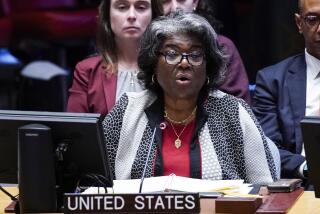Serb Concessions Called Key to U.N. Mission’s Future
ZAGREB, Croatia — As nationalist Serbs plowed through the Bihac “safe area” in northwest Bosnia and harassed hostage peacekeepers, U.N. officials warned Tuesday that the future of their paralyzed mission hinges on rebel compliance with “rock-bottom conditions” for a settlement in Sarajevo today.
U.N. Secretary General Boutros Boutros-Ghali planned a missile-defying flight to the Bosnian capital today in quest of an unlikely breakthrough in what officials here call an untenable standoff between lightly armed peacekeepers and Bosnian Serb warriors emboldened by Western pleas of helplessness in the conflict.
“These are rock-bottom conditions for the continuation of UNPROFOR,” said Michael Williams, spokesman for the U.N. Protection Force based here in the Croatian capital.
Boutros-Ghali will demand an immediate end to fighting in the U.N.-designated Bihac safe area, a cease-fire throughout Bosnia-Herzegovina and a halt to all harassment, detention and restriction of U.N. forces, Williams said.
Without assurances from rogue authorities in the rebel Serb stronghold of Pale, just east of Sarajevo, the future of the mission is in doubt, Williams warned.
“Boutros-Ghali’s visit comes at a moment of truth for UNPROFOR,” a Western diplomat stated, warning that the security of the entire Balkan region hangs in the balance.
The U.N. chief’s intervention in the deteriorating crisis comes as the U.N. mission has begun serious preparations for a pullout because of the campaign of harassment and humiliation to which U.N. troops have been subjected.
Bosnian Serb gunmen loyal to nationalist leader Radovan Karadzic have taken 500 peacekeepers hostage for use as human shields in the event the North Atlantic Treaty Organization again attempts air strikes against the rebels to force their compliance with U.N. resolutions.
Both Bosnian and Croatian Serbs have continued to shell and burn their way deep into the refugee-thronged safe area delineated around Bihac for Bosnian Muslims who are the targets of the long-running nationalist Serb siege.
Serbian gunmen also have blocked humanitarian aid convoys headed for other embattled Muslim enclaves; mined roads to peacekeeping bases, and positioned sophisticated surface-to-air missiles around Bihac and around the U.N.-controlled airport at Sarajevo.
“The Bosnian Serb army has made a number of very threatening remarks in regard to the airport in recent days,” Williams said, expressing concern over Boutros-Ghali’s trip to the Bosnian capital.
Diplomats of the five-nation Contact Group traveled to Sarajevo on Tuesday despite Serbian refusals to give routine assurances for their safety. During their discussions with officials of the Muslim-led Bosnian government, the mediators from the United States, Russia, Britain, France and Germany said they planned no new “incentives” to entice the dominant rebel Serbs to make peace.
U.N. and U.S. sources said a day earlier that U.S. officials capitulated to pressures from other Contact Group countries to allow the Bosnian Serbs to form a confederation with the rump Yugoslavia, which would effectively endorse the creation of a Greater Serbia by allowing the rebels to annex their conquered Bosnian territory to that of their nationalist sponsors in Belgrade, the Serbian and Yugoslav capital.
“I know there have been rumors about changes in the plan--those are not true,” the U.S. representative in the Contact Group, Charles Thomas, told reporters in Sarajevo. “We stick with the plan. We insist that the map be accepted, and we believe that this is a viable plan to achieve peace in this part of the world.”
The Contact Group earlier this year drafted a plan for bringing peace to Bosnia through ethnic division, giving 51% of the republic’s territory to the internationally recognized government and 49% to the rebel Serbs who have seized nearly half again as much as that through artillery assaults and “ethnic cleansing.”
While Thomas insisted that the United States had not changed its attitude toward granting the Serbs confederation rights, other diplomats here and in Washington said the Clinton Administration was keeping that option open.
“We still haven’t said we will go along with equal rights, though I suppose we may,” one diplomatic source said of the contentious proposal to allow the rebels the same right to confederate with Serbia as the Bosnian federation of Muslims and Croats is expected to have with Croatia.
The Bosnian government reluctantly agreed to the Contact Group peace formula in July because it gave sovereign rights, such as U.N. membership and powers of confederation, exclusively to the Muslim-Croatian alliance based in Sarajevo. The government opposes sharing those rights with the separatist Serbs for fear their confederation with Serbia would lead to partition.
Meanwhile, Bosnian and Croatian Serb gunmen continued their deadly push through the Bihac safe haven, closing to within 600 yards of the city’s sole hospital, where 1,600 war wounded are crowded into the 700-bed facility.
Williams said that at least five artillery shells struck close to the hospital and that the situation in the purported refuge had become “critical and grave.”
More to Read
Sign up for Essential California
The most important California stories and recommendations in your inbox every morning.
You may occasionally receive promotional content from the Los Angeles Times.











